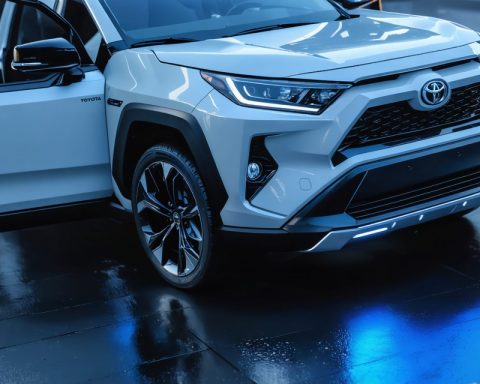- Chinese EV giants, such as BYD, Nio, and Xpeng, are entering Malaysia’s automotive market, posing serious competition to local brands like Proton.
- The strategic move targets ASEAN markets, where regulatory barriers are fewer than in Western countries.
- Chinese EVs offer eco-friendly, affordable options, attracting growing interest from Malaysia’s expanding middle class.
- Price cuts by Chinese manufacturers, such as BYD’s Atto 3, intensify competition with local models like Proton e. Mas 7.
- The local auto industry faces a pivotal challenge to adapt and innovate amidst these transformative shifts.
- Malaysia’s automotive future will require blending tradition with modern technology to remain competitive.
- The industry’s survival depends on visionary leadership and a proactive embrace of sustainability and new technology.
Beneath Southeast Asia’s tropical canopy lies a simmering storm threatening to reshape Malaysia’s automotive landscape. Chinese electric vehicle (EV) titans, renowned for their rapid innovation and sleek manufacturing prowess, are setting their sights on the burgeoning markets of Malaysia and its ASEAN neighbors.
Visualize sleek Chinese EVs gliding silently through Malaysian urban centers, their cutting-edge designs drawing awed gazes. Brands such as BYD, Nio, and Xpeng come not as mere competitors but as harbingers of a profound industrial shift. These brands, celebrated for their eco-friendly advances and affordability, recognize the ASEAN region as an untapped reservoir of opportunity where they can roam free from the rigid regulations that guard Western markets.
Alarm bells ring throughout Malaysia’s auto industry corridors where homegrown giants, like Proton, now face an unprecedented threat at their doorsteps. The allure of affordable prosperity shines brightly for a burgeoning Malaysian middle class, yet it casts a daunting shadow over local industry veterans. Just last month, BYD slashed prices by up to 26,000 ringgit (US$5,900) for their Atto 3 electric SUV, positioning it against Malaysia’s own Proton e. Mas 7 in a high-stake duel at showrooms.
The ramifications? For Malaysia, famed for its resilient local manufacturing and cherished national brands, the emergence of low-cost, high-quality Chinese offerings poses an existential threat. This isn’t merely a market share battle but a seismic shift in consumer preferences and industrial dynamics. Smoothly, silently, the aspirational hum of electric motors may soon replace the rumbling engines of history.
The true test lies in adaptation and innovation, urging Malaysia’s auto industry to embrace an undeniable flux. This is an industry caught at the crossroads—where tradition must harmonize with technology. As the tides of the global economy ebb and flow, Malaysia finds itself navigating between the tenacity of its storied car manufacturers and the agile newcomers who speak the language of sustainability.
The vibrant world of tomorrow’s automobiles demands leaders capable of seeing beyond mere survival to a future where Malaysia not only competes but also thrives. The clock ticks as Malaysia’s auto titans are called not to retreat but to reinvent, weaving ingenuity into every rivet, determined to craft a future powered by innovation and resilience.
Riding the Electric Wave: How Chinese EVs Are Transforming Malaysia’s Automotive Scene
The Rise of Chinese EVs in Malaysia
The entry of Chinese electric vehicles (EVs) like BYD, Nio, and Xpeng into Malaysia marks a pivotal era for the nation’s automotive industry. These brands represent more than mere competition; they symbolize a paradigm shift towards sustainable, high-tech transportation solutions. With their affordability and pioneering technology, these EVs are becoming increasingly attractive to Malaysia’s burgeoning middle-class consumers.
The Impact on Local Industry
The arrival of Chinese EV giants presents both a challenge and an opportunity for Malaysia. Historically dominated by local automakers like Proton, the Malaysian auto market is now confronting an existential threat. The aggressive pricing strategies of Chinese companies, such as BYD’s notable price reduction for the Atto 3 SUV, underscore the urgent need for local manufacturers to innovate and adapt.
Pressing Questions and Insights
1. What Does This Mean for Local Car Manufacturers?
Local brands like Proton must evolve by investing in new technologies, forming strategic partnerships, and enhancing their value propositions to remain competitive. The emphasis should be on integrating modern tech, exploring cleaner energy solutions, and potentially collaborating with other international EV makers.
2. How Can Malaysia’s Industry Adapt?
Adaptation could involve shifting focus to electric vehicles, improving supply chain efficiencies, and building a robust infrastructure for EV charging stations. The government can play a crucial role by incentivizing research and development in EV technology and offering subsidies to encourage local EV adoption.
3. What Are the Challenges of EV Adoption?
Significant challenges include the development of EV infrastructure, consumer education, and the need for policies that support both local innovation and global competitiveness. Additionally, addressing environmental concerns related to battery production and disposal remains critical.
Predictions and Market Trends
Forecasts & Industry Trends
The ASEAN region, particularly Malaysia, is set to witness robust growth in EV adoption over the next decade. According to Frost & Sullivan, Southeast Asia’s EV market is expected to grow significantly as consumer preferences shift towards sustainable and cost-effective mobility solutions.
Actionable Recommendations
1. Enhance Local Production: Encourage partnerships between local companies and international EV leaders to boost technology transfer and scalability.
2. Government Incentives: Proposed tax benefits and subsidies for both manufacturers and consumers can accelerate market penetration.
3. Infrastructure Development: Invest in the expansion of EV charging networks across urban and rural areas to ease consumer transition to electric vehicles.
Quick Tips for Consumers
– Research Before Buying: Consider factors such as the total cost of ownership, charging infrastructure availability, and vehicle range when considering an EV purchase.
– Stay Informed: Continuously monitor updates on government incentives, as policies can significantly affect EV affordability.
BYD and Nio are leading the charge in reshaping global and local automotive landscapes with their innovative and budget-friendly electric vehicles.
In conclusion, Malaysia’s journey into the electric vehicle arena represents an exciting transformation that requires strategic initiatives, government support, and a proactive approach from local manufacturers to compete and thrive alongside international contenders.











